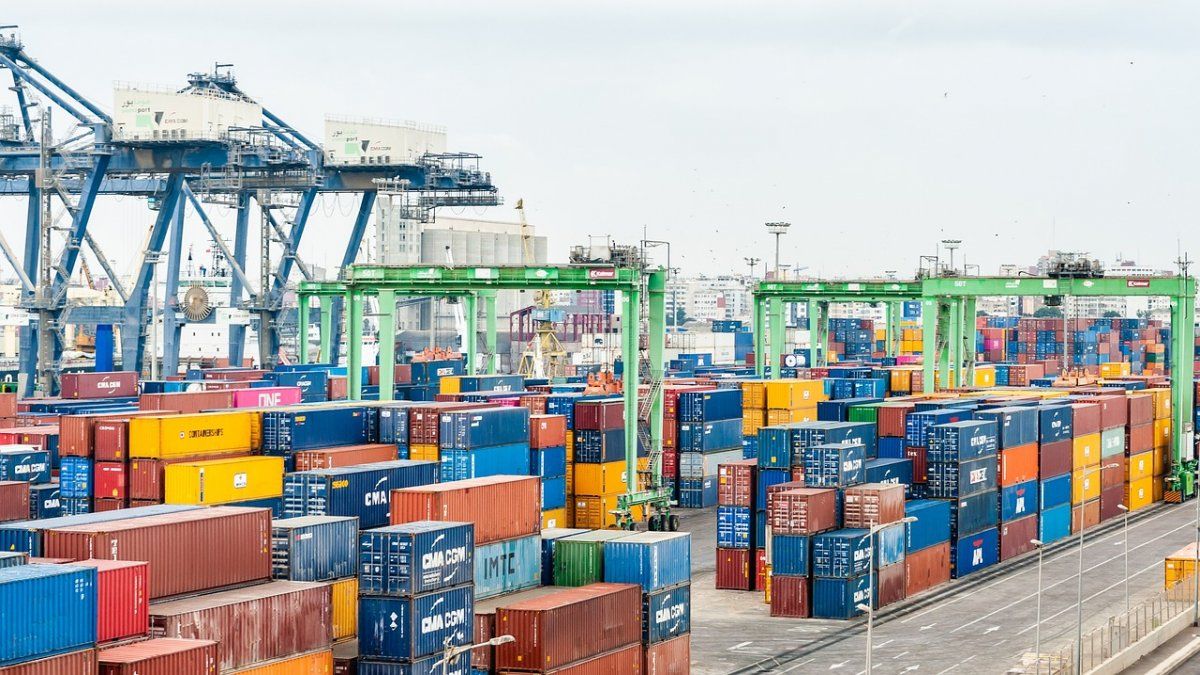In the nine months of 2023, according to official data from the INDEC, the imports They reached US$58,156 million, a drop that represents 10%. But the exports They were also affected: they represent US$51,196. In this case, the decrease is 20%. Thus, the trade deficit It reaches almost US$7 billion.
During the year, there were multiple complaints from companies that matter due to delays in authorizations or payments. As he was able to know AmbitBetween January and September 2023, 99% of the total applications made through the Import System of the Argentine Republic (SIRA) were approved.
The amount of import operations Authorized during the first 9 months of the year was 468,358 applications, which represents a total amount of US$57,453 million. Both 2022 and 2023 were the years in which a historical import record. In 2023, only one was authorized 6% less imports compared to the same period of the previous year. During this period, applications were authorized for 25,142 companies, of which 97% They were SMEs.
Federico Vacarezza, economist specializing in international markets He made his own assessment of this system: “The standard thing in any more or less normal economy is that you do not have this type of import administration mechanisms. But since Argentina is an economy that functions irregularly, its foreign trade needs to be administered. In that sense, it can be said that it fulfilled its objective. Currencies were managed in a chaotic year due to the lack of dollars, there was no shortage of supplies for the productive sectors, and the interests of businessmen, the government and consumers could be moderately reconciled.”
At the same time, he indicated that in an economy that operates at an international level, this mechanism would not be applied considering that “reduces competitiveness, generates unpredictability, bureaucracy, extra costs and distances productive investments.” However, before the shortage of foreign currency, holds, “is a necessary evil”.
From the side of the SMEsone of the exponents is Daniel Rosato from IPA Industriales Pymes Argentinos who provided his vision on the current situation: “imports are complicated for the entire industry in general due to the lack of dollars and the possibility of transferring abroad, which is generating inconveniences. But we understand that this has to do with a economic crisis situation that we are going through. On the other hand, he highlighted the “SME dollar” and assured that “little by little it will become normal,” he concluded.
Inside imports: what the September data left us
According to a recent report by the ABECEB consulting With the latest data from September, despite the restrictions in the SIRAs, there was an increase in the imported volumes. Within the imports, the following could be observed:
- Fuels and lubricants (-42.6%), which decreased due to lower international prices – mainly gas – and lower imported quantities of gas after the inauguration of the Néstor Kirchner Gas Pipeline.
- The intermediate goods For their part, they recorded a drop in their imported values of 12.4% in the annual comparison in September, mainly affected by lower international prices (-17.7% yoy) while imported quantities grew 6.7% yoy.
- Thirdly, there were the imports of consumer goods recording an interannual decrease of 8.4% in September and, finally, imports of capital goods that showed the most moderate fall, of 2.5% yoy, explained entirely by a decrease in quantities (- 3, 3% ai).
On the contrary, the Imports of Motor Vehicles showed a very notable increase of 95.3% yoy, explained in its entirety by an increase in quantities of +90.6% yoy, within the framework of a normalization process after the 85% collapse that had been registered in the two-month period July – August, with vehicles that had accumulated and delayed in customs waiting for the closing of the agreement between the government and the sector for the incorporation of certain models to the Fair Prices program.
Imports: the situation of large companies
A prominent source in the business world that matters, consulted in relation to the SIRA balance, maintained that since its application the situation was “deterioration”. “It is an instrument that has not provided any type of predictability as announced, which has not proven to be either transparent or seriously institutional. It is being constantly violated by the same government, changing the rules of the game”.
One of the main concerns of businessmen lies in the debt with importers that reach US$40,000, where an additional US$20,000 are linked to the postponement of payments for imports. From that point, they emphasize that it is a situation that must be resolved and they maintain the expectation that it will be next year.
In relation to payments, they point out that some Argentine businessmen are being denounced by export companies in countries of origin for export credit agencies due to this reason. What they call “business import debt” is the panorama that some specific companies are facing.
In relation to this point, one piece of information to take into account is the last Exchange Balance published by the central bank of the month of August that accounts for this “deferral of payments”, although it must be clarified that this is outdated information compared to that of the ICA itself.
According to him BCRA, In the month of August, payments for imports of goods in August totaled US$4,095 million, 34% below the same month of the previous year. This value was below the August FOB imports of goods, which are estimated at US$6,461 million, which could indicate an increase in the commercial debt or one decrease in external assets for advances made previously.
Of the total import payments Of goods observed in August, 89% were made deferred, 6% as demand payments and the remaining 5% in advance.
On the other hand, in relation to the amount of imports The source highlights that it is likely that the growth in imports as indicated by official organizations is also due to inflation in dollars and not necessarily an increase in volumes.
Imports: concern about the ballot and what is expected for 2024
The companies that matter are in a situation of uncertainty until the runoff. According to business sources, payments have been 99% suspended since the elections and it is currently the ninth business day that no payments are going abroad. This leads to difficulty for the compliance with your business debts at least until November 20.
As of December 11, whoever wins the electoral contest, the same difficulties are expected until the middle of the year if Argentina manages to rebuild the Central Bank’s reserves, something that is strongly highlighted. “urgent”.
From ABECEB, they warn ahead that a “significant reversal” of foreign trade trends and the trade balance, at least until December when it would begin to impact the fine wheat harvest.
“On the import side, without reserves in the BCRA and with strong exchange rate pressures that will continue at least until the electoral results are settled and whoever is elected makes his economic program explicit, the import trap will continue to tighten as has been happening in recent weeks, where a strong slowdown in operations in the channel of critical SIRAs,” they say.
In this sense, they emphasize that some sectors that used to have their SIRAs approved on the 10th of each month, “are only having very partial approvals.” Among the sectors with the greatest problems are the chemical and food industries and in some specific cases, the health sector.
Source: Ambito




